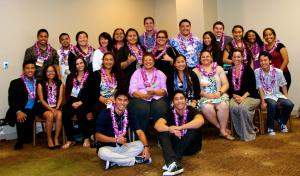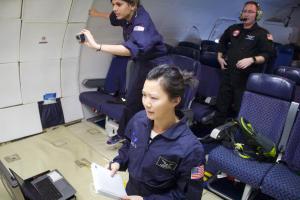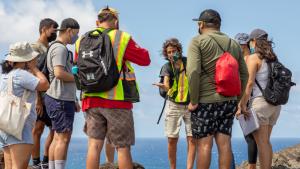UH Mānoa bolstering underrepresented, wāhine faculty in STEM
University of Hawaiʻi at MānoaADVANCE Catalyst Project Manager, School of Ocean and Earth Science and Technology
With the aim of increasing the number of underrepresented, wāhine (women) faculty in the science, technology, engineering and math (STEM) fields, the University of Hawai‘i at Mānoa began a new project funded by the National Science Foundation (NSF) for more than $300,000.
The highly competitive NSF ADVANCE Catalyst award will support a team of UH Mānoa administrators and faculty to develop a UH Mānoa diversity, equity and inclusion (DEI) strategic plan that includes modifying recruitment, retention and promotion practices; mentoring; and creating pathways to hiring UH Mānoa graduates for faculty positions.
“As the flagship campus of a 10-campus system, the University of Hawaiʻi at Mānoa seeks to better understand the experiences of nā wāhine (women) who identify as academic professionals in STEM, in particular women from Native Hawaiian, Filipino and other underrepresented groups,” said UH Mānoa Provost Michael Bruno, who is also the principal investigator on the new project. “We know that a more diverse workforce is a more creative, caring and effective workforce, and that diversity within our STEM faculty ranks will in turn lead to a more diverse STEM student body.”
As one of a handful of institutions that are land-, sea-, space-, and sun-grant institutions, UH Mānoa attracts many STEM professionals who want to explore, innovate, study, share and educate in Hawaiʻi’s rich ecosystems. Yet, by the numbers, the presence of women in the STEM academic professions is low, and not for the lack of women on campus. In fall 2020, UH Mānoa’s women were more than 50% of the student population, but less than 34% of the STEM faculty population and only 29% of full professors in UH’s STEM schools and colleges. These numbers are further reduced for women STEM professionals with intersecting underrepresented identities, despite UH Mānoa graduating the largest number of Native Hawaiian students of any location in the world.
Investigating supports, barriers
During the two-year project, the team will conduct an institutional self-assessment to investigate supports and barriers to advancements of women faculty in STEM; pilot activities to develop an organizational change strategy that brings equity for women into UH Mānoa’s tenure and promotion processes; and develop a five-year STEM faculty equity plan in partnership with the Native Hawaiian Place of Learning Advancement Office and other DEI leaders at UH Mānoa.
The anticipated strategic plan will mitigate negative practices and promote more equitable and inclusive practices to improve the well-being of all academic professionals at UH Mānoa.
“The potential impacts of these structural changes for Indigenous, island-based and local women invested in academic STEM professions will have far reaching consequences for full participation of women and persons with other intersecting identities beyond just our campus.” said Jenny Engels, ADVANCE Catalyst project manager. “We are determined to change academia, starting at UH Mānoa, to create more opportunities for success and leadership among our wāhine faculty, that draw upon women’s experiences as models of strength, resilience and perspective.”
This two-year project will be followed by a larger “institutional transformation” grant that will implement the recommendations of the catalyst’s diversity, equity and inclusion strategic plan.
In addition to Bruno and Engels, the ADVANCE Catalyst team members include co-principal investigators Healani Chang, Truc Nguyen, Jennifer Griswold, Frankie Zhu; and lead researchers Lani Teves and Tom Shea.
This work is supported by the National Science Foundation ADVANCE Program Award Number: 2200748



